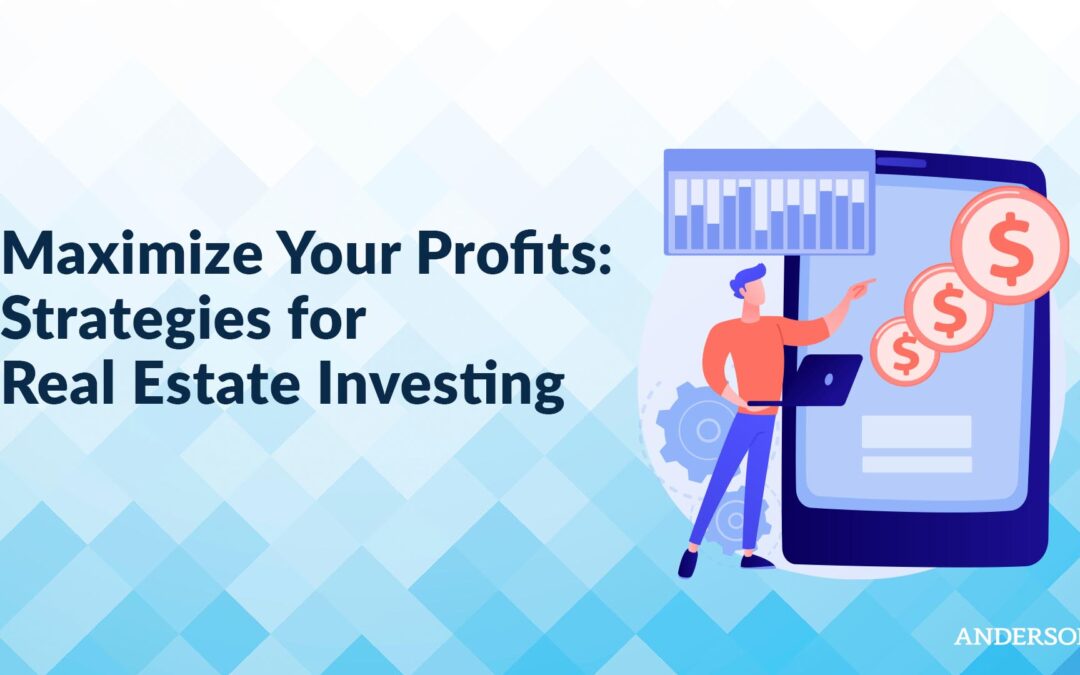Investing in real estate is a great way to build your portfolio and enjoy ongoing profits. Whether you want to repair and sell an investment property or rent out a space to residential or commercial tenants, real estate investing offers many opportunities. We have compiled a list of strategies to help you maximize your profits when it comes to real estate investing.
Key Takeaways
- It’s possible to invest in real estate using different strategies, including owning physical property or buying and selling equities.
- Market research is an important part of investing in real estate and includes comparing costs, rental prices, and different strategies.
- Diversification reduces losses in a declining housing market by earning profits in another, more profitable one.
- Creating a strategy can help you decide when it’s time to add additional assets to your investment portfolio.
- Protecting your real estate investments is crucial to maximizing your profits and minimizing losses in other assets.
What Is a Real Estate Investing Strategy?
A real estate investing strategy is when you own real estate assets with the purpose of generating a profit. Your strategy may vary depending on the assets you own and your risk tolerance level. Some people may prefer a short-term strategy that involves buying and selling real estate assets, whereas others prefer long-term or vacation rentals.
It’s also possible to invest in real estate through stocks and equities. This real estate investment strategy may be ideal for investors who want to earn a profit without owning physical property or land.
How To Maximize Your Profits When Investing in Real Estate
Investing in real estate is a great way to build wealth. Here are a few strategies to maximize your profits when investing in real estate:
Do Your Research
Thorough research is important when it comes to real estate investments. Once you develop a plan to invest in real estate, it can be tempting to jump in with both feet. However, the real estate market is constantly fluctuating, as are interest rates. Whether your goal is to buy a property, make repairs, and then sell or rent, it’s crucial that you choose the right property.
Understanding real estate’s micro and macroeconomics is always a good starting point before investing. In-demand markets often lead to multiple investors bidding on the same property, often driving the price above market value. Slower markets may take longer to recognize returns but may be an option when investing in long-term rental properties.
When doing your research, a few key factors to consider are the number of properties listed versus the number of sales in the area, the average selling price, the average rental rate, and whether the market is trending upwards or downwards. Talk to us about Estate Planning today!
Tax & Asset Protection Workshop
Learn about Real Estate & Asset Protection at our next
FREE LIVE STREAM
Price Out All Investment Options
Perhaps your plan is to purchase a property, make repairs, and then sell it at a higher price. Yet, it’s still a good idea to price out all options to choose the best strategy. For example, if the property is located in a highly in-demand rental district, you may earn more profit by managing tenants for a few years before selling.
When choosing the best strategy, compare all carrying costs with the potential income. The most successful real estate investors are willing to adjust their strategy as needed based on market trends and local home values.
Consider Your Risk Level
As a general rule, the greater the risk, the greater the profit potential. However, riskier investments can also lead to larger losses, making it important to gauge your risk tolerance level before choosing the best investments for your portfolio.
Some investors prefer to maximize profits quickly by selling assets as fast as possible. The best way to do this is with a fix and flip property. Choosing a property in need of repairs can be a great investment if you have the funds or resources available to make them. Offloading your assets quickly can lead to higher capital gains taxes but can reduce other costs like taxes, insurance, and interest. Additionally, there are strategies that can help you avoid capital gains taxes.
Other investors prefer a long-term approach to investing. Holding an asset and renting it to long-term tenants may not produce as much profit as quickly when you factor in mortgage and interest payments. However, the longer you hold the property, the more equity you build through making payments and increasing property values. Once your long-term renters move out, you can choose new renters or sell the property.
Calculate Costs up Front
You’ll need to truly understand your upfront costs to maximize your profits. Most real estate investments come with expenses; without properly accounting for them, they can easily cut your profits. Consider costs like buying and selling commissions, repairs, property taxes, upkeep costs, and insurance. It’s also important to account for unexpected costs, like roof repairs or appliance replacements.
In addition to calculating upfront costs, you’ll also want to predict your profits as accurately as possible. Compare your property to similar ones in the area to find out how much you can sell it for or how much it’s worth in rent.
Know When To Grow Your Portfolio
A single real estate asset can produce substantial profits. Multiple real estate assets in your portfolio can result in even more profits and help offset losses through diversification. If possible, reinvest any profits you make into additional assets. Stripping equity is a great way to fund another asset. This strategy involves pulling out any equity you earn in a property and using the capital to invest in additional assets.
Diversification also allows you to increase your profits through multiple income streams. If you already have a few residential properties, consider investing in a vacation rental in a highly desirable tourist attraction or opt for a commercial property that you can lease to businesses. A multi-family asset may also be an option. The upkeep costs of larger residential buildings may be higher, but you’ll receive monthly rent from multiple tenants to help offset the costs.
One of the biggest benefits of diversification is dividing your risk among multiple assets. Even if one of your properties experiences significant losses due to declining populations and housing values, a different property in an in-demand city can offset them.
Consider Non-traditional Investments
When most people think of real estate investing, they think of physical real estate assets. Other ways to invest in real estate include real estate investment trusts (REITs), investing platforms, or stocks and equities.
It’s even possible to invest in real estate without extra funds. Invest in real estate with no money by renting your current property or using your home’s equity to buy another one. You can also live in an asset while you make necessary repairs and then rent or sell the asset. This allows you to better control costs, which maximizes your profits. Short sales and lease-to-own investments also tend to be less competitive and may result in higher profits.
Protect Your Assets
Protecting your assets is also an important part of investing in real estate. Purchasing assets using a limited liability company (LLC) protects your personal finances. Compartmentalizing different assets into multiple LLCs also protects the profits of one asset from the losses of another one.
Another popular estate planning tool that can help to protect your wealth is transferring your real estate assets to a trust. This protects your profits from debt collectors, lawsuits, and even a lengthy probate process for your beneficiaries.
Learn To Maximize Your Profits in Real Estate
If you’re interested in investing in real estate, you’re probably wondering how to maximize your profits best. No strategy fits all investment portfolios, so creating a customized plan based on your financial goals and risk level is important. Do you want to learn how to maximize your profits and expand your real estate portfolio? Anderson Advisors can offer you a free strategy session to put your financial goals in motion.
Free Strategy Session with an Anderson Advisor
Receive a detailed risk assessment to assist in lowering problem areas that could wipe out all of your assets with one wrong move. Speak with an Anderson Professional Advisor to get your FREE Strategy Session. Limited-Time Offer: FREE (a $750 value.)
















